Questionhi labman,
please help..i have a shep puppy who is almost 5 months old. i thought i had him house broke he was doing very well then for no reason started to mess up. i tried to cage him off to just the kitchen area, and by doing this he has started to get into everything. i cage him at night, and he goes in fine, but by morning he has messed in his cage (both poop and pee) and i do not know how to break him of this. it has ended up that he is now in his cage in the garage. my husband will not allow him in the house anymore till i train him..i have tried everything.he is hard headed. barks, jumps,wont sit, pees in the house everything. i even took him to dog school for 3 weeks cost 350 bucks and it did not work. i really need some big time help in training this dog before my husband just takes him and drops him to the pound please....
thank you
neilley
AnswerThis sounds to me like a matter of status, not housebreaking. It is a little early, but I would neuter him now. Next, you need to learn what your $350 class should have been about. The key to most behavior problems is approaching things using the dog's natural instincts. Dogs see all the people and dogs in the household as a pack with each having their own rank in the pack and a top dog. Life is much easier if the 2 legged pack members outrank the 4 legged ones. A good obedience class or book is about you being top dog, not about rewarding standard commands with a treat. Start at http://www.dogsbestfriend.com/
Here are some more ways to establish yourself as top dog:
''Elevation for small puppies: Sit on the floor and gently put your hands around your pup's middle, below his front legs, and lift him up. He is facing you. Hold him for 15 seconds. Repeat until he no longer struggles. If he is past 10-12 weeks, lift his front feet off the ground, but don't pick him up.
Cradling for small puppies: Hold your puppy gently on his back, as you would cradle a small baby. If he struggles, hold him firmly until he quiets for 10-15 seconds. With larger pups, you can do this as your sit on the floor, with your pup between your legs.
Quiet lying down: Place your pup on the floor on his side, with all 4 legs pointing away from you. Use your hands on his neck/shoulder area and middle, to hold him in this position. When he is quiet, praise him. Lengthen the time that you keep him quietly in this position. When he accepts this position well, handle his paws and muzzle, while keeping him quiet.''
The quotes mean this isn't my original work. It is copied from my Puppy Raising Manual. I have long used these or minor variations of them, and they are very effective. You may want to give him a belly rub while he is on his back too. Helps bonding. There is a big difference between him rolling over and demanding a belly rub, and you choosing a time to roll him over and rub his belly. The latter cements your place as pack leader.
This link is meant for older dogs, http://www.dogbreedinfo.com./topdogrules.htm
You can't do the above with him exiled to the garage. Working with him outside will help. Bonding is especially important with the Shepherds. You must have him with you, keeping him in sight at all times when he is out of the crate. Some people even leash the dog to them. I really hope my advice helps. I am afraid many dogs are exiled or dumped at the pound when all the onwer needed was some good advice. Last of all, I am pasting in info on housebreaking. Read through it, and use what you need.
Much of housebreaking is not training the puppy, but making it easier for your
puppy, you, and your carpet while its body to catches up to its instincts. At
around 8 weeks when the puppy goes to its new home, the time from when it
realizes it has to go, and when it can't wait any longer is a matter of
seconds. Only time will fix that. You can hardly be expected to be attentive
enough to avoid all accidents There is no sense punishing the puppy for your
inattention. It is not fair to punish you either, but you still have to clean
it up if you didn't have the puppy outside in time.
Housebreaking starts before you get home with the new puppy. If you don't have
a crate, buy one. I prefer the more enclosed, den like plastic ones. Skip the
bedding. At first it gets wet, and later it can be chewed into choking
hazards. A wire rack in the bottom will help keep the puppy up out of
accidents at first. They are available with the crates, but a piece of closely
spaced wire closet shelving from a home supply place is cheaper. If you
already have a metal crate, covering it may help. Just make sure you use
something the puppy can't pull in and chew. Dogs that start out in crates as
little puppies, accept them very well. Never leave an unattended puppy loose
in the house. If nobody can watch it, put it in the crate. I suggest letting
the dog have its crate all its life.
Choose a command and spot you want it to use. The less accessible to strays,
the less chance of serious disease. If it is a female, choosing a
non grassy spot will avoid brown spots later. When you bring it home, take it
to the spot and give it the command in a firm, but friendly voice. Keep
repeating the command and let the puppy sniff around. If it does anything,
praise it. Really let it know what a good dog it is and how much you love it,
and maybe a treat. Note, being out there not only means you can praise it,
but it also keeps it from being snatched by a hawk. If it doesn't go, take it
inside and give it a drink and any meals scheduled. A young puppy will need to
go out immediately afterward. Go to the spot and follow the above routine.
Praising it if it goes is extremely important. If it doesn't go, take it back
inside and put it in its crate and try again soon. Do not let it loose in the
house until it does go.
At first it is your responsibility to know and take the puppy out when it
needs to go. It needs to go out the first thing in the morning, after eating,
drinking, and sleeping. If it quits playing, and starts running around
sniffing, it is looking for a place to go. Take it out quickly. You will just
have to be what I call puppy broke until it is a little older.
By the time most dogs are about 3 months old, they have figured out that if
they go to the door and stand, you will let them out. The praise slowly shifts
to going to the door. Some people hang a bell there for the dog to paw. If
your dog doesn't figure this out, try praising it and putting it out if it
even gets near the door. A stern "Bad dog!" is all the punishment that is
effective, and only when you catch it in the act and are sure you didn't miss
it going to the door. Clean up accidents promptly. I mostly keep the little
puppies out of the carpeted rooms. Still I need the can of carpet foam
sometimes. First blot up all the urine you can with a dry towel. Keep moving
it and stepping on it until a fresh area stays dry. A couple big putty knives
work well on bowel movements. Just slide one under it while holding it with
the other. This gets it up with a minimum of pushing it down into the carpet.
This works with even relatively soft ones, vomit, dirt from over turned house
plants, or anything else from solids to thick liquids. Finish up with a good
shot of carpet foam. Note, do not let the puppy lick up the carpet foam.
Once the dog is reliably housebroken, your carpet may need a good steam cleaning.
Many people strongly strongly push cleaning up all evidence of past accidents. I am slower to suggest that. Dogs will return to the same spot if they can find it. When you see one sniffing the spot, that is your clue to run it out.

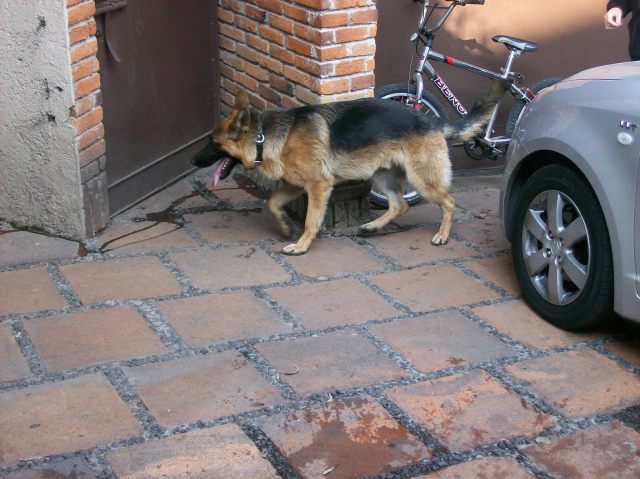 doubts on my GSD growth
Question
Tosco Dog
Hi Labman, I wanted to ask you until
doubts on my GSD growth
Question
Tosco Dog
Hi Labman, I wanted to ask you until
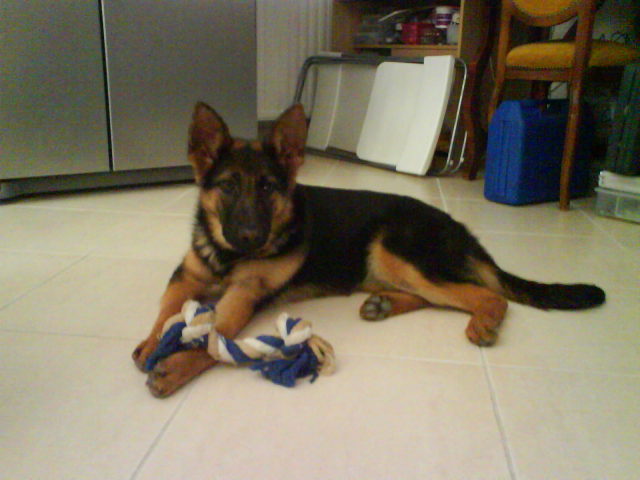 poor growth because bad nutrition
Question
7 month
I bought a female gsd when she was 7 m
poor growth because bad nutrition
Question
7 month
I bought a female gsd when she was 7 m
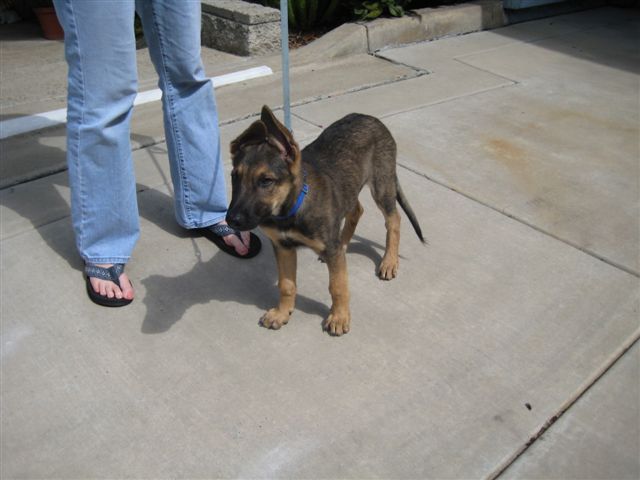 3 month old German Shepherd ears.
QuestionQUESTION: Hello and thank you for you time. I a
3 month old German Shepherd ears.
QuestionQUESTION: Hello and thank you for you time. I a
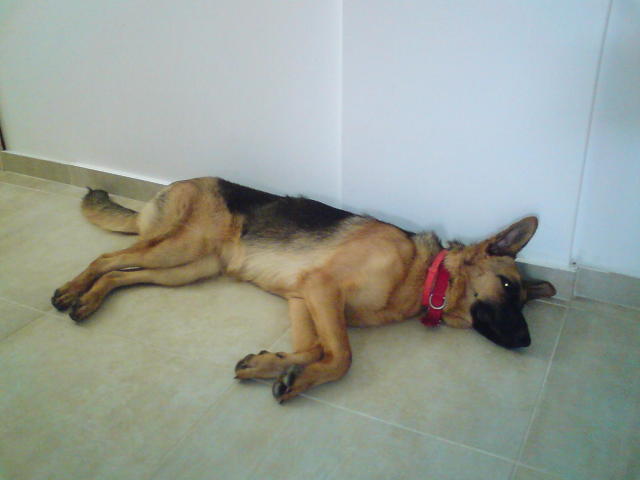 puppy growing thin and tall
Question
Lying down
Hi, I have a 9 month old German She
puppy growing thin and tall
Question
Lying down
Hi, I have a 9 month old German She
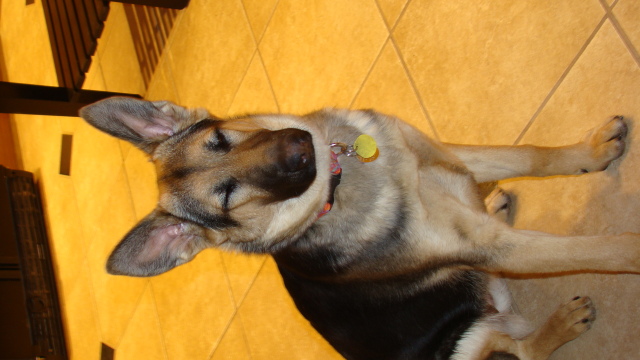 tymber
Question
tymber
ok my gsd is now 7 months old and i hav
tymber
Question
tymber
ok my gsd is now 7 months old and i hav